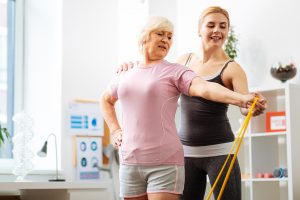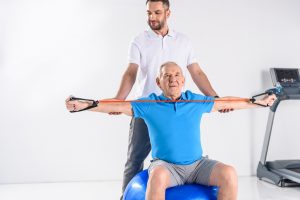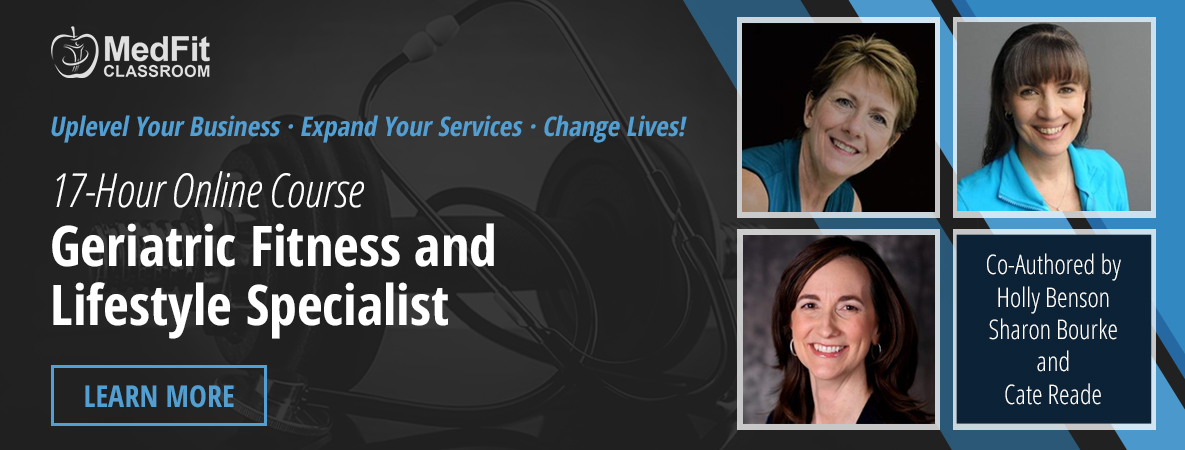In the world of medical and mainstream fitness, assessment methods and tools abound. We like to pre-test and post-test and record our findings to show positive change toward the betterment of our clients’ general health. But what about their well-being? Are we asking them how they are really doing on that day and in general? Should we probe further or would that be invasive and make our older client feel uncomfortable and possibly interrogated?

These are the questions we need to ask ourselves as trainers before we begin our journey with 65-plus clients. We need much more information than just the basic anthropometrics and test performance baselines to be successful in coaching and educating for positive outcomes.
We must find out what motivates them, what holds them back, and what they value in life. This is the foundation from which we begin facilitating successful change toward better health, vitality, and optimal aging.
Before a training program is ever developed, we must know who we are working with on a biopsychosocial level. This model of questions and assessments is based on the biopsychosocial model proposed by Dr. George Engel in 1977. According to Engel’s model, a person’s biological, social and psychological factors are all intertwined and these factors also influence general well-being. In other words, a person’s body and mind are not separate entities. What we understand about mind set and self-efficacy applies to the geriatric population more than any other demographic. These clients must be intrinsically motivated toward change. They will make better choices and comply to commit to regular exercise and healthy nutrition more eagerly when they feel compassionately “understood” from the inside out. They know very well that they are not just a physical body under the forces of biological aging and functional decline.
With decline comes fear. With fear comes doubt. Doubt can inhibit progress or even prevent someone from starting at all. If they are having these feelings you need to know, and it’s ok to gently ask.
Asking the right questions opens the door to answers that will reveal the doubts and fears that have been holding them back, and this paves the way to exploring for solutions. We cannot change what we do not acknowledge. We must address the psychological issues and adjust the protocols to suit the needs and desires of the older adult first. This builds client/trainer trust and this partnership is a powerful motivator toward making better choices and lifestyle changes that can improve the older adults’ health and well-being.
Often our older adult clients don’t know what they don’t know and proper interviewing leads the way to addressing their unique needs and circumstances. Asking the right questions early in the training process helps trainers help their clients establish a sound WHY or purpose for change, and is one of the most effective techniques a trainer can implement when getting started with a new geriatric client.

Finding a good set of questions to gather this critical information can be challenging. There are several examples to draw from that follow the biopsychosocial model. One resource that is very comprehensive is the EASYCareTM Assessment Questionnaire found online. It is quite lengthy. However, it shows a diverse sampling of questions, and can be a useful guide for trainers wanting to develop their own questionnaire.
So we must ask the right questions in the beginning in order to set the tone, tailor the program, and address the needs of the client. It should not stop there. The communication should be ongoing throughout the programming to allow the trainer to adjust as needed to create the best experience possible for geriatric clients every time they meet with us. This in turn will create positive outcomes both physically and emotionally and foster a happy, healthy, and optimally aging adult.
Fitness Pros: Expand your services as a Geriatric Fitness and Lifestyle Specialist
It’s estimated that 80% of the older population has one chronic disease and 77% have two or more. This means millions of people over age 65 looking for guidance from fitness professionals who are knowledgeable in exercise, nutrition and lifestyle principles that can help them improve functional mobility, while also preventing and managing chronic conditions to live their highest quality of life. The Geriatric Fitness and Lifestyle Specialist online course will give you insights, strategies and tools to be a successful health professional in this rapidly growing market.
Holly H. Benson is a veteran in the Recreation and Fitness industries with over 35 years of administrative and technical experience. She has developed thriving fitness programs for special populations and has passionately focused her career on the much older adult. She currently owns and operates Moving Strong Medical Exercise, LLC in Lakewood, Colorado and provides in-home and virtual fitness training to older adults and persons with chronic medical and orthopedic conditions.


